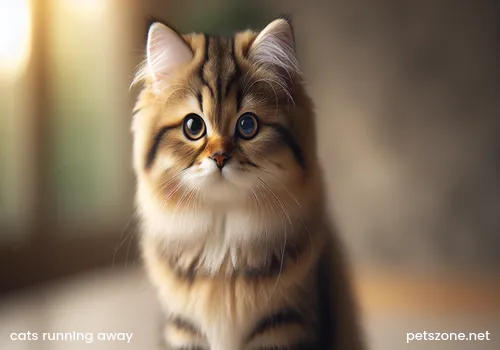Feng Shui Omens of Cats Running Away from Home_Feng Shui Hints and Responses Behind Domestic Cats Running Away
When a cat suddenly runs away from home, it truly makes pet owners extremely anxious! Besides worrying about their safety, many also think about some Feng Shui sayings, wondering if there are special hints behind this. In fact, there are various reasons why cats run away, including their natural animal habits, the home environment, and the owner’s care methods. Of course, in some traditional views, the arrival or departure of cats is indeed given certain Feng Shui meanings.

Could cats running away from home be a Feng Shui hint? What do traditional sayings say?
In traditional perspectives, the appearance and departure of cats are often given symbolic meanings. There is a popular folk saying: "Pig comes for poverty, dog comes for wealth, cat comes to cover the white cloth." This sounds a bit scary. The phrase "cat comes to cover the white cloth" refers to the cat’s meow sounding like words meaning "extinguish," "gone," or "moldy," thus considered an unlucky omen. This saying believes that if a wild cat suddenly comes into the home, it might not be a good sign and could even mean misfortune. There are also some sayings that stray cats symbolize wealth luck, and their arrival at home means good fortune will happen. Some even think that if a cat comes in and cannot be driven away, it indicates the family is kind-hearted, harmonious, and wealthy, so the cat does not want to leave.
Additionally, some say cats belong to wood in the Five Elements. If your birth chart favors wood or fire, raising cats may help compensate for deficiencies and bring good luck. However, if born in unsuitable months or if one’s birth chart dislikes wood and fire, keeping a cat may bring bad luck. Some superstitions say that if a cat runs away, it might indicate the family’s wealth is leaking away.
It should be noted that these Feng Shui sayings about cats are mostly folk traditions lacking scientific basis, serving more as explanations and psychological comfort for the unknown. When facing a cat running away, it is more important to analyze scientifically and practically and actively search for the cat.
The real reasons cats run away: “Cat language” owners need to know
Putting aside Feng Shui interpretations, cats run away for many practical reasons. Understanding these reasons helps better prevent and respond.
- Exploration desire and curiosity: Cats are naturally curious about the outside world. Especially cats living indoors for a long time yearn even more for the outside. When they have a chance, they may slip out to explore.
- Estrus period: Unneutered cats during their heat cycle are hormonally driven to go out looking for mates. This is one of the most common reasons for running away.
- Feeling unwell or sick: When a cat is uncomfortable or near death, instinctively it may hide and find a secluded, safe place to spend time alone. Some believe this is the cat not wanting to make the owner sad.
- Feeling stressed or dissatisfied: If a cat feels stressed, unhappy, or is often scolded or punished by the owner, it may try to escape the environment.
- Getting lost: For indoor cats unfamiliar with the outside, once they leave, they can easily become lost due to stress or unfamiliar routes.
- Seeking a better life: Some say if cats are not satisfied at home, such as insufficient food or poor living conditions, they may leave to look for a better environment.
- Age factors: Young kittens gradually become independent and territorial while growing and may start exploring outside. Elderly cats near the end of life may show behavioral changes, including seeking hidden places.
- Being abducted: Unfortunately, some cats run away because they are kidnapped.
Signs before cats run away: Pay attention to these small details!
Before deciding to run away, cats often show some “clues.” Attentive owners who notice these early signs may take timely actions to win back the "master's" heart.
- Behavioral changes: A cat planning to run away may start avoiding the owner, shun close contact, or show dissatisfaction or aggression toward other family members. If a normally clingy cat suddenly becomes independent or even a bit “cold,” attention is needed. Conversely, sick or dying cats may become especially clingy.
- “Studying” doors and windows: Cats preparing to leave may show unusual interest in doors and windows, secretly watching how the owner opens and closes them, even imitating attempts.
- Changes in appetite and water intake: Sick or dying cats often show loss of appetite or drinking difficulties.
- Appearance changes: Dying cats may become unkempt, neglect grooming, with dull and coarse fur, and possible eye abnormalities.
Responses after domestic cats run away: Feng Shui resolutions and practical actions
If the cat sadly runs away, besides worry and guilt, what can we do?
From a Feng Shui perspective, although there is no definite “Feng Shui resolution” for cats running away, some traditional practices may provide psychological comfort. For example, after the cat leaves, keep the home clean and tidy, avoid clutter accumulation. This not only meets hygiene needs but is believed to help keep the home’s energy flow. Some Feng Shui theories hold that a clean, odorless house brings wealth fortune. Also, check if there are places unsuitable for pet items, such as not placing cat litter boxes near wealth locations.
However, more important than vague Feng Shui is taking practical actions to find the cat.
- Act immediately: The first two days after leaving are golden hours to find the cat.
- Search near home: Most domestic cats do not go far and may hide in nearby concealed places like bushes, under cars, basements, or storage rooms.
- Create lost cat notices: Attach clear photos, features, lost location, and contact info; post in the neighborhood, pet stores, veterinary clinics, and social platforms.
- Contact property and community: Inform them about the lost cat and ask for help in keeping an eye out.
- Place items with the cat’s scent: Place used litter boxes, bedding, or the owner’s clothes near the door or places the cat might come by; the cat might follow the scent back.
- Search at night: Cats are usually active at night; look for them at dusk or dawn, gently calling their name.
- Install surveillance: If possible, install cameras near doors or windows to catch any cat movements in time.
How to prevent cats running away: Preparation is key!
“Better late than never,” but the best method is to prevent cats from running away in advance.
- Seal windows and balconies: This is the most direct and effective way. Ensure doors, windows, and balconies have protective screens to prevent cats from slipping out or falling.
- Neuter at the right time: Neutering effectively reduces the cat’s drive to leave seeking mates during estrus.
- Provide a rich living environment: Provide enough toys, scratching posts, and climbing frames, so cats have ample activity and entertainment at home, reducing curiosity about outside.
- Give enough love and companionship: Spend more time with cats, interact and play to build a good relationship, letting them feel the warmth and safety of home.
- Provide sufficient food and clean water: Ensure cats’ material needs are met so they feel home is the best place.
- Avoid corporal punishment and intimidation: Educate cats gently and patiently, avoid violent or frightening methods to prevent fear and rejection of home.
- Regular health checkups: Pay attention to cats’ health, detect and treat diseases promptly to avoid their hiding due to discomfort.
- Wear collars with contact info or implant microchips: These measures increase chances of recovery if cats get lost.
Frequently Asked Questions
- Q: Does cats running away mean the home’s Feng Shui is bad?
A: Cats run away for many reasons and multiple factors. Although some traditional Feng Shui say so, these lack scientific support. Most often, it’s due to cats’ needs, habits, or external environment. - Q: Is a black cat running away more unlucky than cats of other colors?
A: In some folk legends, black cats have special meanings. Some places believe black cats ward off evil, others think they are unlucky. These are superstitions; a cat running away has no scientific connection to fur color. - Q: Can cats find their way back after running away?
A: Some cats, especially those familiar with their surroundings, can find their way home. But cats kept indoors long-term and unfamiliar with outside have greater difficulty finding the way back if lost.
Conclusion
Cats running away is heartbreaking. Whether it’s concern over Feng Shui or the cat’s safety, we all hope to find them quickly. In such situations, staying calm, using scientific and effective searching methods, and reflecting and improving care methods to provide a safe, comfortable, and loving home are most important. As for Feng Shui, understanding it as a cultural phenomenon is fine, but do not overly believe it, so as not to affect our judgment and actions.





